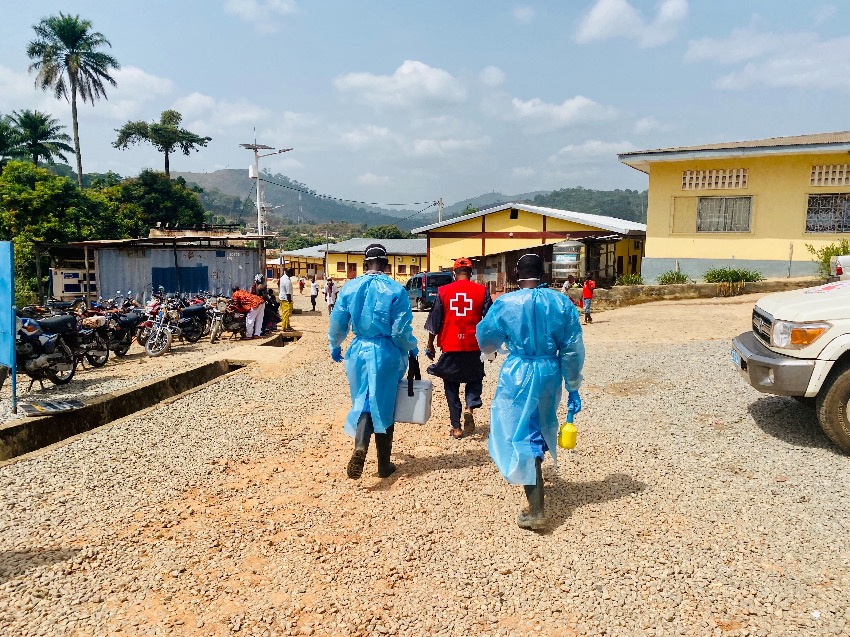Managing the "Double Epidemic"
The health system in Guinea is regularly challenged by the emergence of diseases with epidemic potential, including yellow fever, meningitis, and cholera. Following the Ebola outbreak 2013-2015 which affected almost all regions of the country, Epidemic Treatment Centres were set up to improve the response to future health crises. Nevertheless, the Ebola outbreak inevitably weakened the Guinean health system. On 12 March 2020, Guinea faced its first case of COVID-19. The Ministry of Health rapidly rolled out responsive measures to limit the spread of the outbreak. Besides the impacts of COVID-19, the Guinean government declared an Ebola outbreak in the prefecture of N’Zérékoré as of 14 February 2021.
The French Red Cross has been collaborating with the Guinean Red Cross and the Guinean authorities since 2014, when the first Ebola outbreak occurred. To help respond to the double epidemic and prevent future health crises, the Red Cross has been implementing a variety of activities with support from the European Union (EU) Delegation in Guinea. Those activities include case management and contract tracing, as well as community awareness raising and hygiene promotion.

As part of this collaboration, new Epidemic Treatment Centres have been established in the regions of N`Zérékoré, Mamou, Labé and Boké to reduce the strain on local health systems by handling cases of COVID-19 and other diseases with epidemic potential. Moreover, capacities to monitor epidemic risks at the local level are strengthened, suspected cases are identified, and contract tracing is facilitated. Beyond the treatment of COVID-19 patients, the Guinean Red Cross and French Red Cross support the government in its national vaccination rollout plan by strengthening equitable and quality vaccination services among high-risk groups. Furthermore, Red Cross volunteers are reaching out to communities to dispel rumours about vaccines and their safety. The project supports the Guinean Red Cross and local health authorities in their response to epidemics. Psychosocial support is provided to affected patients and their families, and the service of safe and dignified burials of those who died from Ebola helps families grieve the loss of a loved one with dignity while reducing risks of infection. Since the first Ebola epidemic in the country, the health authorities recognise the Guinean Red Cross as a partner for ensuring secure and dignified burials.
Through this joint project, the regional health directorates are receiving the support they need to improve the management of suspected or confirmed COVID-19 and Ebola cases. Thus, the Guinean Red Cross’ epidemic preparedness and response capacities are strengthened overall. “We welcomed this project with open arms”, says Kassié Fangamou, Health Regional Director for the Mamou region. “It will help us to address shortcomings in patient care and the operation of epidemic treatment centres. The support of the Red Cross and the EU has been key in setting up regional epidemic alerts and response teams. We are delighted that they have helped us to reinforce these mechanisms!”

The Red Cross is implementing an Infection Prevention Control (IPC) programme which includes setting up and strengthening triage systems for patients upon entering an Epidemic Treatment Centre, as well as installing handwashing stations and reusable “quarantine bubbles” to isolate suspected COVID-19 or Ebola cases. Other activities like community-based epidemiological surveillance, case investigation and contact tracing significantly strengthen the awareness of individual communities.
While COVID-19 is an ongoing issue in Guinea and around the world, the efforts to manage the double epidemic have paid off: on 19 June 2021, the Guinean government and the World Health Organization (WHO) officially declared the end of the Ebola outbreak, signifying 42 days without a single case being detected. The short length and swift end of the outbreak in the country demonstrate that working together and learning from each other is vital in strengthening the response to – and prevention of – epidemics and pandemics challenging health systems now and in the future.
Basic information
Activity name
Support to the COVID-19 response and other epidemic potential diseases in Guinea
Country
Republic of Guinea
Duration
August 2020 - December 2021
Partners
Guinean Red Cross, French Red Cross, European Union Delegation in Guinea
For additional information, please view the following documents (in French):
Project file: "Appui à la réponse sanitaire contre la pandémie de COVID-19 et aux maladies à potentiel épidémique en République de Guinée" (Support to the health response against the COVID-19 pandemic and diseases with epidemic potential in the Republic of Guinea)
Country file: "La Croix-Rouge française en Guinée" (The French Red Cross in Guinea)

